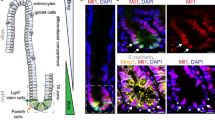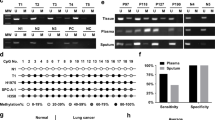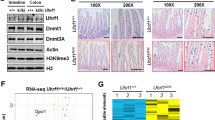Abstract
Aberrant activation and upregulation of the Wnt pathway is a key feature of many cancers. Wnt antagonists have recently attracted wide attention. Wnt inhibitory factor-1 (WIF-1) is a secreted antagonist that can bind to Wnt proteins directly and inhibit Wnt signaling pathway. It has been reported that WIF-1 expression is down regulated in several solid tumors and that WIF-1 is silenced by promoter hypermethylation in lung and colorectal cancer. By using RT–PCR, bisulfite sequence analysis, and methylation-specific PCR, we analysed expression and methylation of WIF-1 in cancer cell lines and freshly resected cancer tissues of the esophagus, stomach, colorectum, and pancreas. Downregulation of WIF-1 mRNA expression was observed in 61 (91.0%) of 67 cancer cell lines, 16 (80.0%) of 20 esophageal, 23 (74.2%) of 31 gastric, 41 (82.0%) of 50 colorectal, and six (75.0%) of eight pancreatic cancer tissues. Downregulation of WIF-1 expression was also observed at protein level. No significant association between WIF-1 downregulation and clinicopathological characteristics was found, suggesting that downregulation of WIF-1 expression is an early event in carcinogenesis of these cancers. Indeed, downregulation of WIF-1 expression was observed in 32 (72.7%) of 44 colorectal adenoma tissues and 18 (78.2%) of 23 early mucosal or submucosal colorectal carcinoma tissues. CpG island hypermethylation in the WIF-1 promoter region correlated with downregulation of WIF-1 expression in cancer cell lines and tissues. Treatment with demethylating agent, 5-aza-2′-deoxycytidine (5-aza-dC), restored WIF-1 expression in cancer cell lines. A combined treatment of 5-aza-dC and a histone deacetylase inhibitor, trichostatinA, restored WIF-1 expression synergistically, indicating the role of cytosine methylation and histone deacetylation in the silencing of the WIF-1 gene. Transfection of the WIF-1 gene construct into TE-1 esophageal cancer cell lines or SW48 colon cancer cell lines lacking WIF-1 expression resulted in a significant inhibition on colony formation, cell proliferation, anchorage-independent growth in soft agar. TOPflash assay showed WIF-1 inhibits Wnt canonical signaling in these cell lines. These results suggest tumor suppressive function of WIF-1, due to its ability to inhibit Wnt signaling. Our results suggest that WIF-1 silencing due to promoter hypermethylation is an important mechanism underlying aberrant activation of the Wnt signaling pathway in carcinogenesis of the digestive organs. Modulation of the Wnt pathway, through reversal of WIF-1 silencing by demethylating agents, is a potential target for treatment and/or prevention of gastrointestinal cancers.
This is a preview of subscription content, access via your institution
Access options
Subscribe to this journal
Receive 50 print issues and online access
$259.00 per year
only $5.18 per issue
Buy this article
- Purchase on SpringerLink
- Instant access to full article PDF
Prices may be subject to local taxes which are calculated during checkout




Similar content being viewed by others
References
Caldwell GM, Jones C, Gensberg K, Jan S, Hardy RG, Byrd P, Chughtai S, Wallis Y, Matthews GM and Morton DG . (2004). Cancer Res., 64, 883–888.
Cameron E, Bachman KE, Myohanen S, Herman JG and Baylin SB . (1999). Nat. Genet., 21, 103–107.
Cebrat M, Strzadala L and Kisielow P . (2004). Cancer Lett., 206, 107–113.
Giles RH, van Es JH and Clevers H . (2003). Biochem. Biophys. Acta., 1653, 1–24.
He B, Reguart N, You L, Mazieres J, Xu Z, Lee AY, Mikami I, McCormick F and Jablons DM . (2005). Oncogene, 24, 3054–3058.
Herman JG, Graff JR, Myohanen S, Nelkin BD and Baylin SB . (1996). Proc. Natl. Acad. Sci. USA, 93, 9821–9826.
Holcombe RF, Marsh JL, Waterman ML, Lin F, Milovanovic T and Truong T . (2002). Mol. Pathol., 55, 220–226.
Hsieh JC, Kodjabachian L, Rebbert ML, Rattner A, Smallwood PM, Samos CH, Nusse R, Dawid IB and Nathans J . (1999). Nature, 398, 431–436.
Ikenoue T, Ijichi H, Kato N, Kanai F, Masaki T, Rengifo W, Okamoto M, Matsumura M, Kawabe T, Shiratori Y and Omata M . (2002). Jpn. J. Cancer Res., 93, 1213–1220.
Katoh M . (2001). Int. J. Oncol., 19, 1003–1007.
Kawano Y and Kypta R . (2003). J. Cell Sci., 116, 2627–2634.
Kirikoshi H, Sekihara H and Katoh M . (2001). Int. J. Oncol., 19, 1221–1225.
Kolligs FT, Bommer G and Goke B . (2002). Digestion, 66, 131–144.
Lustig B and Behrens J . (2003). J. Cancer Res. Clin. Oncol., 129, 199–221.
Mazieres J, He B, You L, Xu Z, Lee AY, Mikami I, Reguart N, Rosell R, McCormick F and Jablons DM . (2004). Cancer Res., 64, 4717–4720.
Mizushima T, Nakagawa H, Kamberov YG, Wilder EL, Klein PS and Rustgi AK . (2002). Cancer Res., 62, 277–282.
Reguart N, He B, Xu Z, You L, Lee AY, Mazieres J, Mikami I, Batra S, Rosell R, McCormick F and Jablons DM . (2004). Biochem. Biophys. Res. Commun., 323, 229–234.
Saitoh T, Mine T and Katoh M . (2002). Int. J. Mol. Med., 9, 515–519.
Smith K, Bui TD, Poulsom R, Kaklamanis L, Williams G and Harris AL . (1999). Br. J. Cancer, 81, 496–502.
Suzuki H, Gabrielson E, Chen W, Anbazhagan R, van Engeland M, Weijenberg MP, Herman JG and Baylin SB . (2002). Nat. Genet., 31, 141–149.
Suzuki H, Watkins DN, Jair KW, Schuebel KE, Markowitz SD, Dong Chen W, Pretlow TP, Yang B, Akiyama Y, Van Engeland M, Toyota M, Tokino T, Hinoda Y, Imai K, Herman JG and Baylin SB . (2004). Nat. Genet., 36, 417–422.
Wissmann C, Wild PJ, Kaiser S, Roepcke S, Stoehr R, Woenckhaus M, Kristiansen G, Hsieh JC, Hofstaedter F, Hartmann A, Knuechel R, Rosenthal A and Pilarsky C . (2003). J. Pathol., 201, 204–212.
Acknowledgements
This work was supported by Grants-in-Aid from the Ministry of Education, Culture, Sports, Science and Technology of Japan (HY and KI), and Ministry of Health, Labor and Welfare of Japan (HY and KI).
Author information
Authors and Affiliations
Corresponding author
Rights and permissions
About this article
Cite this article
Taniguchi, H., Yamamoto, H., Hirata, T. et al. Frequent epigenetic inactivation of Wnt inhibitory factor-1 in human gastrointestinal cancers. Oncogene 24, 7946–7952 (2005). https://doi.org/10.1038/sj.onc.1208910
Received:
Revised:
Accepted:
Published:
Issue Date:
DOI: https://doi.org/10.1038/sj.onc.1208910



